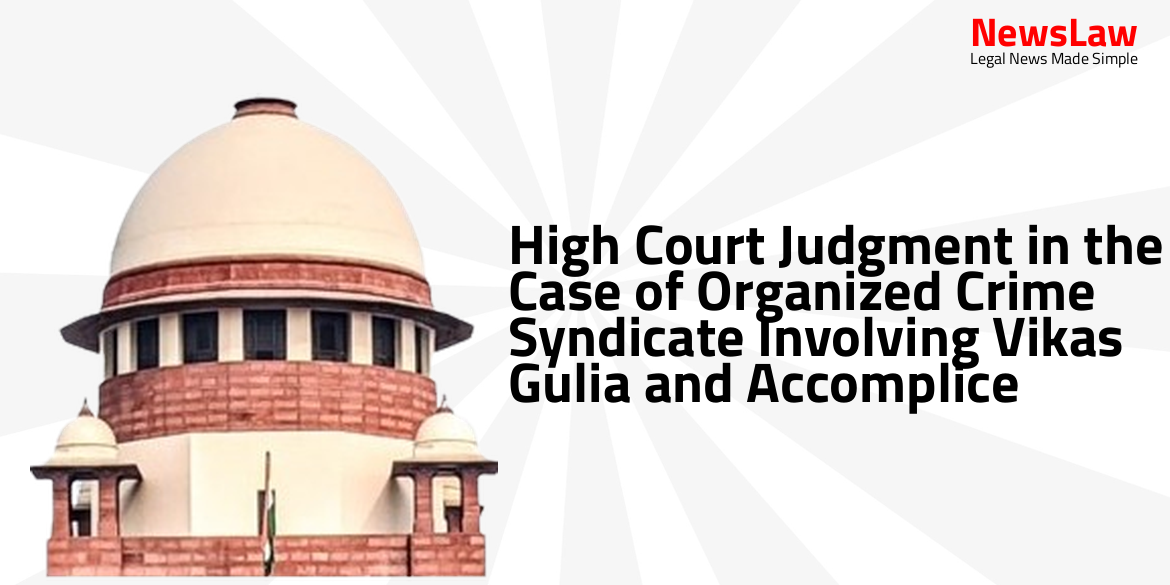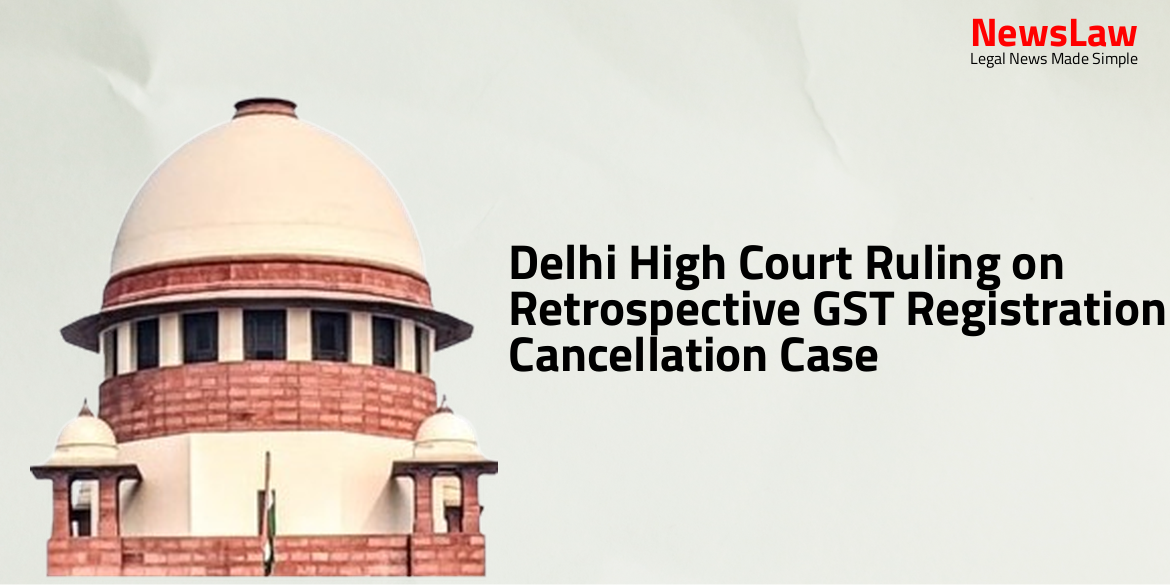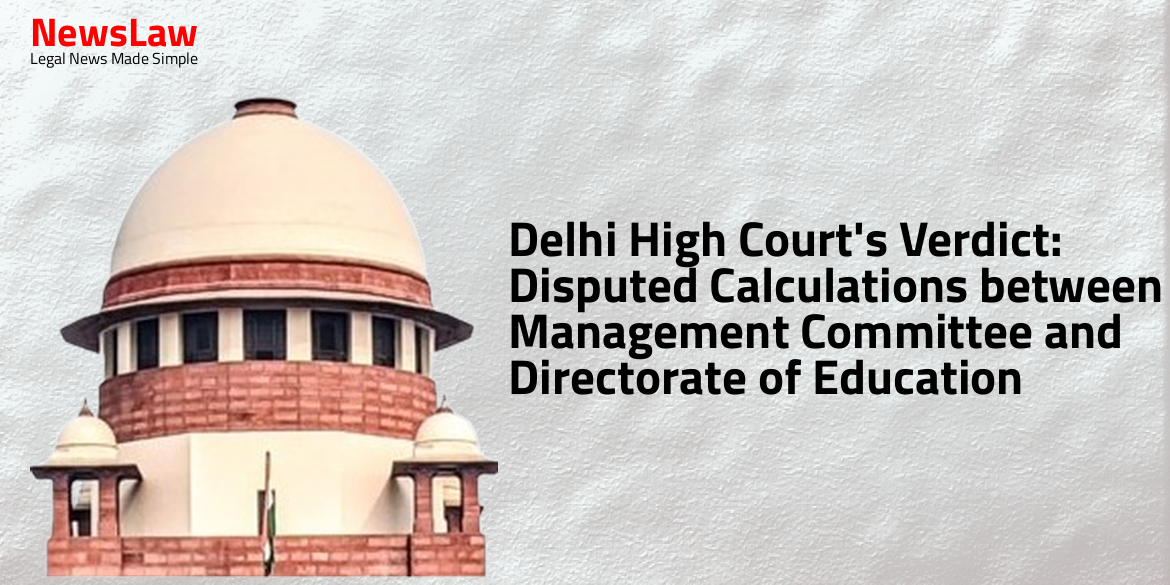The recent judgment by the Delhi High Court pertains to a case involving an organized crime syndicate linked to Vikas Gulia and an accomplice. The court’s decision carries weight in addressing criminal activities and maintaining order in society. It sheds light on the complexities of dealing with organized crime and the importance of stringent legal measures. This ruling marks a significant step towards ensuring justice and enhancing safety for the public.
Facts
- The trial in the present FIR is progressing fast, with 46 out of 86 cited witnesses examined.
- Applicant’s house had CCTV cameras, Rs.70 Lacs cash, multiple SUVs, Safari, and Bolero cars, inconsistent with their income.
- FIR No. 479/2013 at Alipur PS for offences under Sections 188 and 171A of IPC, where Safari car was seized.
- Applicant burnt mobile phones at Bhondsi Jail upon knowing about MCOCA charges.
- Accused Vikas Gulia deported and arrested, leading to dropping of 26 prosecution witnesses in FIR No. 190/2019.
- Applicant’s CDRs show calls to family, friends, and co-accused, also used mobile in jail for extortion calls.
- Car in question purchased from Paramjeet, applicant arrested and linked to multiple serious crimes.
- Chargesheet filed with 86 witnesses, no witnesses coming forward due to fear and nature of accused’s activities.
- Applicant member of Vikas Langarpuria Gang, accomplice of Vikas Gulia involved in multiple serious cases.
- Vikas Gulia involved in land grabbing case, arrested but did not confess.
- Applicant and Vikas lent money, pressurizing borrowers to clear debts, linked to extortion and violence incidents.
- Applicant used mobile in jail for extortion calls, associated with Sonia for financial transactions worth more than Rs. 35 Lacs.
- ITRs of Sonia show low income compared to transactions, bank details of family members investigated.
- Applicant demanded money in FIR No. 212/2015, fired upon shop to intimidate complainant.
- Bail application under Section 439 of Cr.P.C. filed for release in FIR No. 531/2015 under MCOCA.
- Similar instances of extortion in FIR No. 227/2015, applicant confessed before DCP, South-West.
- FIR against Vikas Gulia and associates under MCOCA revealing a pattern of serious criminal activities.
- Houses of Vikas Gulia and applicant visited, running an organized crime syndicate causing terror in society.
- Application to call accused for admitting/denying documents moved by APP under Section 294 of Cr.P.C.
- Accused Vikas Gulia @ Vikas Langarpuria convicted and sentenced to life imprisonment in FIR No 60/2014 at Police Station: Hisar Civil Lines, Haryana
- Accused declared as Proclaimed Offender on 28.05.2019 after jumping interim bail
- Applicant also jumped interim bail for wife’s treatment and NBWs issued against him on 13.01.2022
- Applicant apprehended on 28.04.2022 with illegal pistol and two live cartridges in another FIR No 93/2022 at Police Station: Special Cell, Delhi
Arguments
- The applicant argues that he is not on bail in any previous case under the MCOCA.
- The delay in trial and prolonged incarceration cannot be solely blamed on the prosecution.
- There are no allegations in the specified FIR that the applicant committed an offense on behalf of a syndicate.
- Without specific allegations in the chargesheet, proceedings under the MCOCA cannot be invoked or continued.
- The requirement for Sections 2(1)(d) and 2(1)(e) of the MCOCA is not fulfilled in the present case.
- Previous involvement in cases should not prevent the grant of bail if the accused’s current role and likelihood of fleeing are assessed.
- Delays in trial proceedings diminish the constraints on bail even in cases involving Special Acts.
- The benefit of Section 428 of the Cr.P.C. can be claimed if the accused was detained for investigation, inquiry, or trial and then convicted.
- Claims that no offense is made out under Sections 3 and 4 of the MCOCA against the applicant are raised.
- The judgments relied upon by the applicant emphasize the importance of current involvement and likelihood of fleeing when granting bail.
- Independent witnesses supporting the prosecution’s case are highlighted.
- Acquittal in previous cases and the lack of specific allegations in the FIRs are pointed out to argue against sustaining the MCOCA charge.
- The applicant’s 8 years of custody and the ongoing trial proceedings are cited as justifications for bail.
- The necessity of proving offenses in alignment with the MCOCA criteria is a key argument by the applicant.
- The applicant’s involvement in the alleged syndicate is contested by citing lack of evidence in various FIRs.
- Case laws and judgments are referenced to support the applicant’s position on bail and lack of MCOCA charges against him.
- Arguments regarding bail eligibility under different sections of the Cr.P.C. are presented.
- The applicant’s role and connections with Vikas Gulia @ Vikas Langarpuria are scrutinized in relation to the alleged crimes and syndicate involvement.
- The applicant is deemed a habitual offender and likely to commit further crimes if released on bail.
- Discretionary power available at the stage of awarding sentence.
- Reference to Mushthafa P.K. v. State of Kerala, 2014 SCC OnLine Ker 8482 by the Kerala High Court.
- Lack of confidence in the conduct of the applicant and the co-accused.
- Co-accused escaping to the United Arab Emirates and being deported because of non-surrendering.
- Applicant’s arrest in FIR No 93/2022 under Section 25 of the Arms Act.
- Citing State of Maharashtra v. Vishwanath Maranna Shetty, (2012) 10 SCC 561 in the context of MCOCA offense.
- Applicant previously released on interim bail for wife’s treatment but jumped bail.
Analysis
- Section 436A of the Cr.P.C. states that an undertrial prisoner cannot be detained for more than one-half of the maximum period of imprisonment specified for the offense charged.
- The provision does not apply when the offense is punishable by death.
- The definition of ‘organized crime’ under MCOCA includes unlawful activities by an individual or group using violence or coercion to gain benefits.
- To be considered ‘organized crime’ under MCOCA, there must be multiple chargesheets filed within the preceding ten years for a cognizable offense punishable with three years or more of imprisonment.
- An ‘organized crime syndicate’ is defined as a group of two or more persons engaging in organized criminal activities.
- Section 21(4) of MCOCA restricts the release on bail for those accused under the Act unless certain conditions are met.
- Flight risk is considered when assessing bail applications, with instances of absconding or re-arrest being significant factors.
- The concept of ‘continuing unlawful activity’ under MCOCA involves repeated criminal activities undertaken by an individual or group.
- The applicant in this case is charged under Section 3 of MCOCA, which involves severe penalties including life imprisonment.
- The prosecution alleges that the co-accused has a history of multiple criminal cases, indicating organized criminal activity.
- The court considered various FIRs and the applicant’s involvement with Vikas Gulia in some of them.
- The court discussed the outcomes of FIR No. 212/2015 and FIR No. 153/2014 in relation to the MCOCA charge.
- The court referred to Supreme Court rulings to determine the relevance of acquittals in previous cases for the current bail application.
- The court emphasized the criteria for invoking MCOCA, which includes organized crime activities and multiple chargesheets filed within a specified period.
- The court clarified that the result of a particular case, such as acquittal, does not determine the applicability of MCOCA.
- The court discussed the impact of delay in trials on bail applications, balancing the rights of the accused and the society.
- The court highlighted the objectives of MCOCA, including addressing organized crime and protecting witnesses.
- The judgment focused on interpreting MCOCA in line with its spirit and object, rather than strict construction.
- The court directed the Trial Court to expedite the ongoing trial within six months of the first hearing post this judgment.
- The court dismissed the bail application based on the applicant’s previous conduct, ongoing trial progress, and potential flight risk.
- Use of violence is not necessary for an activity to fall under organized crime per MCOCA.
- Threat, intimidation, coercion, or other unlawful means are also considered under organized crime.
- Conditions for invoking provisions of GCTOC Act as per Md. Iliyas Mohamad Bilal Kapadiya case.
- Activity of organized crime must be committed within Delhi for MCOCA prosecution per Brijesh Singh case.
- Section 3 of MCOCA can only be invoked based on chargesheets filed after promulgation of MCOCA as per Shiva @ Shivaji Ramaji Sonawane case.
- Expression ‘other advantage’ in MCOCA not limited to pecuniary benefits per case law.
- MCOCA needs to be strictly construed for application of provisions per Abhishek case.
- Applicant not entitled to bail under Section 436A of Cr.P.C. as per court’s decision.
- The maximum punishment for the offense in this case includes death penalty and life imprisonment
- Therefore, the applicant is not eligible for the benefit of Section 436A of the Cr.P.C. at this stage
Decision
- The sentence awarded to the applicant has been suspended by the appellate court.
- The question at this stage is regarding the grant of bail.
- The specific bail application number is 593/2024.
Case Title: DHEERPAL ALIAS KANA Vs. STATE GOVT OF NCT OF DELHI (2024:DHC:4461)
Case Number: BAIL APPLN.-593/2024



